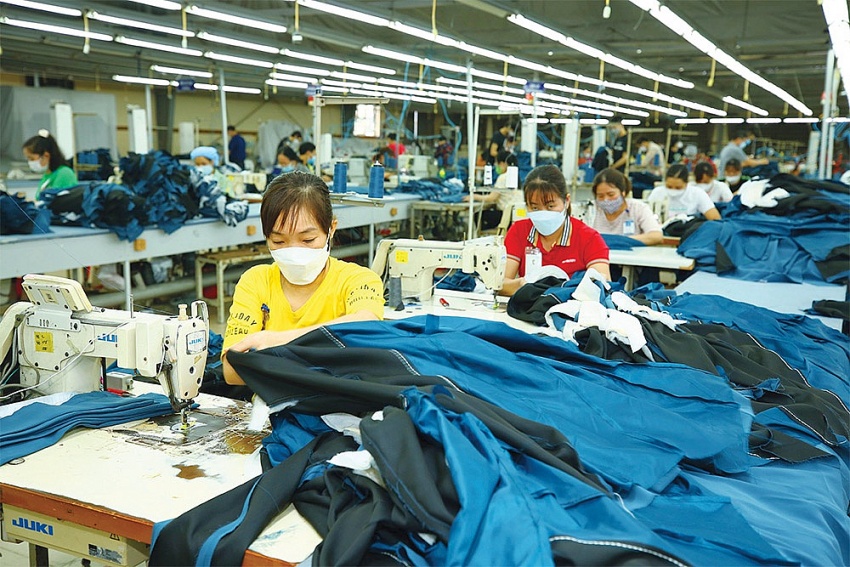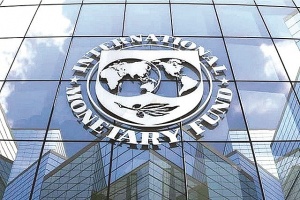Government commits to wide support towards 2025
Deputy Prime Minister Le Minh Khai last week reported to the National Assembly (NA) that the government will provide more practical support for the public and businesses as part of its agenda.
“The government will continue carrying out the policy of exempting and reducing lending rates from bank loans. It will also postpone and restructure debts, and exempt, reduce, and extend the payment of assorted taxes, fees, charges, and land rental for businesses and individuals so that they can soon escape from difficulties,” Khai stated.
He announced that the government will apply this fiscal policy in the latter half of 2024, with a total value of about $4.08 billion. VAT will continue at 8 per cent, and the State Bank of Vietnam has decided to increase the preferential credit package’s value for the forestry and fishery sector to $1.18 billion, and it is also formulating a similar package for the rice sector.
 |
| Some of Vietnam’s businesses teeter on the brink of leaving the market, hence the support proposals, Photo: Le Toan |
The Ministry of Finance reported that in 2023, the total values of all policies on exempting, reducing, and extending payment of assorted taxes, fees, and charges, as well as rental for land and water surface reached about $8.33 billion, including exemption and reduction of $3.3 billion and extension of just over $5 billion.
Last year, extending payment of VAT, corporate income tax, and personal income tax, as well as land rental led to a reduction in the state budget revenue of an estimated sum of $4.58 billion.
It is expected that a continued reduction of 2 per cent VAT for the second half of this year for most services will be discussed and adopted at the NA next month. It is also estimated that the total value of money from exempting and reducing assorted taxes and fees in the first three months of this year reached $858.3 million.
“The government will continue removing difficulties in access to bank loans for enterprises and individuals so that bigger credit flows can run into production and business activities,” DPM Khai stressed. “It is expected that credits will grow 15 per cent and the lending rates from bank loans will be reduced by 1-2 per cent this year.”
In addition, the government pledged that it will also continue cutting and reducing administrative procedures, and effectively renewing the one-door mechanism in addition to digitalisation of data and documents which will help truncate costs for the public and businesses.
Feasible answers required
The government told the NA that despite some positive signals, production and business activities have been facing great difficulties, with so many enterprises having left the market, meaning a decrease in employment and state budget revenues.
Figures from the General Statistics Office showed that last year, 89,100 businesses halted operations in Vietnam – up 20.7 per cent as compared to the previous year; 65,500 enterprises stopped operations and waited for dissolution procedures – up 28.9 per cent; and 14,400 enterprises completed such procedures.
“In the first four months of this year, nearly 86,400 enterprises were kicked out of the market, up 12.2 per cent as compared to the same period last year. On average, 21,600 enterprises faced such a plight every month,” stated a governmental report submitted to the NA.
Notably, in April, more than 7,600 enterprises halted operations – up 84.1 per cent on-month and 6.4 per cent on-year; 4,660 businesses stopped operations and awaited dissolution procedures; and over 1,340 enterprises completed such procedures.
The National Assembly Economic Committee has warned that if no more feasible solutions are applied soon, the number of such enterprises will continue increasing in the next months.
“We see that production and business activities remain bogged down in big difficulties. The number of enterprises leaving the market (86,400) has been greater than the number of businesses newly entering and re-entering the market (81,300),” said the committee at the NA.
“Low demands at the domestic and international markets, besides the low competitiveness of domestically produced products are among the main reasons behind the poor performance of enterprises operating in the manufacturing and processing sector,” the committee pointed out. “In addition, there has been high rises in transportation costs, especially by seas, coupled with the strong fluctuation in exchange rates since early this year; while enterprises are still struggling to meet many complicated administrative regulations such as anti-fire.”
Lack of guidelines
According to the Vietnam Association of Small- and Medium-sized Enterprises, hundreds of thousands of businesses have been facing many difficulties in meeting anti-fire regulations.
“Standards stipulated in 2020 on detailing a number of articles of the Law on Fire Prevention and Fighting are too high and improper, pushing up enterprises’ costs,” the association said.
At present, all factories and production workshops are required to use anti-fire materials. However, it is almost impossible for them to bring this into operation as these materials cannot be tested due to a lack of specific guidelines from authorised agencies.
“Under the regulations, all structures of the factories and workshops have to be painted with anti-fire paints. But the exact names of the paint and where the paint is sold or the thick of paint on the structures have failed to be specified,” said Nguyen Van Son, a lawyer at a law firm in Hanoi.
The government has pledged that it will strive to reach the economic growth target of 6-6.5 per cent this year via the boost of fiscal policy, including a preferential initiative worth $5 billion as low lending rates from bank loans for purchasing social houses and worker-oriented houses.
“Besides that, we will continue boosting the disbursement of public investment which will act as a primer for attracting private investment and increasing public-private partnership funding,” the governmental report read. “Efforts are to be made to reach a 95 per cent disbursement rate in public investment this year.”
| National GDP in Q1 2024, despite some improvements, has yet to return to the right track of economic growth. It is not strong enough to create new breakthroughs for sustainable development and for the country to escape from the risk of falling into a middle-income trap. Growth pillars have yet to bring into play their role as connectors and boosters of economic regions as they are being adversely impacted by a slowdown in the domestic economy and in the world economy. Meanwhile, the country’s aggregate demands remain weak and slow to recover in the context that inflation is showing signals of bouncing back. The consumption demand increased at 5.3 per cent on-year in Q1 – lower than expected, and private investment also followed suit at 4.2 per cent on-year – also lower than expected. There has been a big service trade deficit since early this year. Almost all transportation of goods and logistics services are undertaken by foreign companies. While the mining sector has been declining, the manufacturing and processing sector has yet to regain its growth momentum as it did before 2020. What is more, there have been so many obstructions in administrative procedure reform, making it increasingly difficult for enterprises and the public. Delays in solving administrative procedures and in releasing dossier resolution results are still common in many administrative echelons. It is imperative that continued reform in administrative reform is boosted to facilitate business and investment activities. It is also necessary to further decentralise the decision-making processes, in addition to an increase in inspection and supervision. Source: National Assembly Economic Committee |
 | Government strives to extend fiscal policy outlined by PSRD Amid difficulties forecast to continue undermining the business community, a fiscal policy under Vietnam’s hallmark socioeconomic recovery initiative is expected to be lengthened next year in a bid to fuel enterprises’ performance and achieve desired economic growth. |
 | IMF says Vietnam's fiscal policy should support the vulnerable An International Monetary Fund (IMF) team led by Paulo Medas completed discussions for the 2023 Article IV consultation with Vietnam from June 14-29. |
 | Vietnam’s fiscal policy can perform a stronger role High interest rates elsewhere have led to consumption and export issues. Suan Teck Kin, head of Research at UOB, shared with VIR’s Nhue Man his prospects on Vietnam’s development and its monetary policies to face to the impact of activity involving China and the United States. |
What the stars mean:
★ Poor ★ ★ Promising ★★★ Good ★★★★ Very good ★★★★★ Exceptional
Related Contents
Latest News
More News
- Ho Chi Minh City launches plan for innovation and digital transformation (February 25, 2026 | 09:00)
- Vietnam sets ambitious dairy growth targets (February 24, 2026 | 18:00)
- Masan Consumer names new deputy CEO to drive foods and beverages growth (February 23, 2026 | 20:52)
- Myriad risks ahead, but ones Vietnam can confront (February 20, 2026 | 15:02)
- Vietnam making the leap into AI and semiconductors (February 20, 2026 | 09:37)
- Funding must be activated for semiconductor success (February 20, 2026 | 09:20)
- Resilience as new benchmark for smarter infrastructure (February 19, 2026 | 20:35)
- A golden time to shine within ASEAN (February 19, 2026 | 20:22)
- Vietnam’s pivotal year for advancing sustainability (February 19, 2026 | 08:44)
- Strengthening the core role of industry and trade (February 19, 2026 | 08:35)

 Tag:
Tag:


















 Mobile Version
Mobile Version